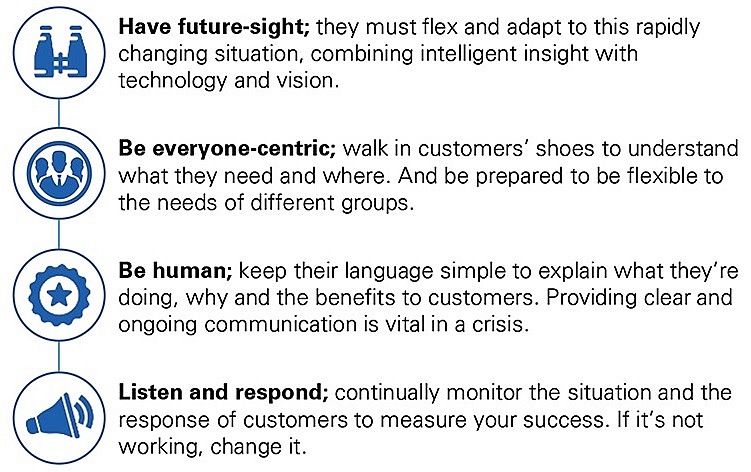A customer-first approach during unprecedented times
 |
| Nguyen Tuan Hong Phuc - Partner Customer & Operations KPMG Vietnam |
The rapid outbreak of the pandemic presents an alarming health crisis that the world is grappling with. There are significant commercial impacts being felt globally. In Vietnam, the number of businesses stopping their operations has hit a record number of nearly 35,000 in the first quarter. For the first time in decades, the number of businesses leaving the market is greater than the number of newly-established ones. Through this crisis, the way organisations engage and interact with their customers will be critical.
During these uncertain times, companies focusing on customer experience may stand the best chance of supporting their customers and protecting their business, while also laying the seeds for future growth. Our Six Pillars of Customer Experience provide the framework for outstanding customer satisfaction, and during the COVID-19 outbreak we see two of the pillars – integrity and empathy – playing an even more important role. By treating customers in the right way now, organisations are able to continue to nurture and likely retain them in the long-term.
Countries around the world are implementing different measures to slow the spread of the disease, including over a third of the global population being put under lockdown as of the end of March. This situation has forced businesses to find new ways to connect with their customers effectively.
This unprecedented situation calls for organisations to understand evolving consumer and community needs, and react to them rapidly. This means both reassuring their customers and also adapting quickly to provide the right products, services, and solutions.
Our pillars that can help businesses to better connect with customers and employees. In normal times, they are powerful tools for creating successful, sustainable, and ethical businesses. When faced with the current global threat, they provide an invaluable guide to corporate behavior in uncertain times. They are a set of simple principles that help to navigate challenges by taking a customer first approach.
As the global situation becomes more complex, how and when companies should lend support to their customers and colleagues is uncharted territory. Unlike disaster relief, there is no roadmap or recipe for company involvement. However, companies must continue to keep their employees’ trust, understand evolving consumer and community needs, and provide products, services, and resources where appropriate.
 |
 |
Six pillars
KPMG’s Six Pillars of Customer Experience is a framework derived from 10 years of primary research across 3,000 brands in 25 countries. It shows the universal principles that govern all positive human experiences with both customers and employees: empathy, personalisation, time and effort, expectations, resolution, integrity. The organisations that master the pillars grow more quickly and manage costs better. Integrity and empathy are the two pillars that companies need to ensure they specifically address if they are to connect emotionally with their customers through these uncertain times.
Acting with integrity
Integrity is the foundation of trust and it is the cornerstone to every experience the customer has towards the company. In times of crisis, when anxiety is high, the way organisations survive and grow will decide its trustworthiness. While people always want to do business with companies that have integrity, those that act responsibly and ethically are likely to prosper and sustain their business beyond the end of the crisis. Organisations taking advantage of the situation by raising prices or miss-selling will quickly lose their customers’ trust.
In the face of COVID-19, many companies in Vietnam decided to act with integrity by doing things that benefit their customers, partners, and the community. For instance, retailers such as Vinmart or Saigon Co.op committed not to increase their prices. Meanwhile, Vietnam Airlines provided the air-bridge to bring Vietnamese home from infected areas, and Vingroup announced it would release an aid package worth VND300 billion ($13 million) to its partners in the shopping centre through discounting rents and issuing vouchers to consumers of Vincom. These are good examples of how an organisation chose to do the right things in these uncertain times.
However, trust cannot be built on a single action. In contrast, it requires companies to demonstrate consistent behaviours in prolonged periods and various situations. It is not until the moment of crisis should companies show they are acting ethically and responsibly. These are the courses of action they have to take consistently when publicly reacting to difficult circumstances. Doing this will help companies gain the public trust and drive long-term rapport with their customers.
Importance of empathy
At a time when all of us are worried for the safety of our loved ones, organisations that demonstrate empathy, put themselves in their customers’ shoes and then adapt the way they do business, thus are likely to ensure their loyalty.
Now is a time for all firms to show they care and reflect back to customers that they are understanding them. In industries that are hit hard like aviation or hospitality, many companies have shown a prompt reaction in response to the crisis and offered flexible rebooking, rerouting, and refund options for customers, as well as extensions of memberships.
During this time, along with focusing on their customers, companies must also show they understand the needs and concerns of their employees. Customer experience and employee engagement are a two-way street and there is a link between customer satisfaction and the engagement level of all front-line, back-office, and management employees.
With workers staying at home and businesses forced to close, 15 per cent of companies in Vietnam had to reduce their scale. As a result, the number of people applying for unemployed insurance in the first two months has increased by 70 per cent compared to last year.
Sharing the burden with employees is what businesses should do to ensure high staff engagement levels when the pandemic ends. For example, Grab Vietnam recently provided a supply aid with 80 tonnes of rice and thousands of instant noodle boxes to its drivers, helping them to overcome difficulties caused by the pandemic.
Responding to the situation
Across the world, COVID-19 is affecting different people in different ways – from those working from home for the first time, to parents entertaining and educating their children 24/7 or just saying goodbye to that much-needed holiday. Organisations in all sectors are innovating at pace to respond to the changing needs of their customers.
Listening to the changing needs of customers and responding with solutions that make people’s lives easier is very important. During the social distancing period in Vietnam, for example, ride-hailing company Grab has launched shopping services that allow customers to shop at home instead of going to the market. Also, many retailers have been promoting their sales on online channels to reduce the number of shoppers coming to the stores.
While empathy and integrity are necessary to survive in this global crisis, companies also need to focus on other pillars to deliver an outstanding customer experience. Doing this will require a lot of the company’s effort, but its rewards are worthy.
| To learn more about KPMG’s work and how KPMG can provide support, please contact the Vietnam office or reach out to Nguyen Tuan Hong Phuc: Partner, Customer & Operations KPMG Tax & Advisory Ltd. T: +84 937105539 E: phuctnguyen@kpmg.com.vn |
What the stars mean:
★ Poor ★ ★ Promising ★★★ Good ★★★★ Very good ★★★★★ Exceptional
Related Contents
Latest News
More News
- KPMG launches tariff modeller in Vietnam to navigate US tariff risks (July 29, 2025 | 12:11)
- Removing hidden barriers to unlock ASEAN trade (June 29, 2025 | 11:31)
- New report charts path for Vietnam’s clinical trial growth (May 21, 2025 | 08:58)
- TTC Agris strengthens market position with investment in Bien Hoa Consumer JSC (May 19, 2025 | 10:14)
- World Bank to help SBV build shared database for banking industry (April 09, 2025 | 08:55)
- New trade alliances and investment hubs are redefining global power dynamics (April 03, 2025 | 17:00)
- ACCA and KPMG forge path for business leaders to pioneer ESG excellence (March 07, 2025 | 10:09)
- VietBank signs MoU with KPMG (February 26, 2025 | 18:47)
- Warrick Cleine MBE: an honour for services to British trade and investment in Vietnam (December 31, 2024 | 20:16)
- KPMG report offers fresh insight into leveraging AI (December 24, 2024 | 09:23)

 Tag:
Tag:


















 Mobile Version
Mobile Version